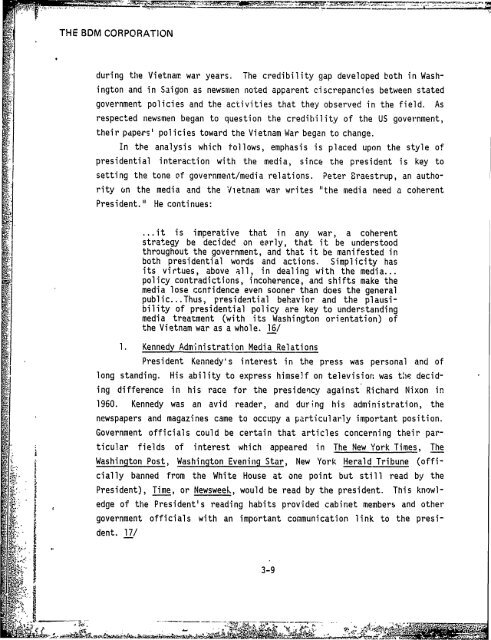policy - The Black Vault
policy - The Black Vault
policy - The Black Vault
You also want an ePaper? Increase the reach of your titles
YUMPU automatically turns print PDFs into web optimized ePapers that Google loves.
THE BDM CORPORATION<br />
during the Vietnam war years.<br />
<strong>The</strong> credibility gap developed both in Washington<br />
and in Saigon as newsmen noted apparent ciscrepancies between stated<br />
government policies and the activities that they observed in the field. As<br />
respected newsmen began to question the credibility of the US government,<br />
their papers' policies toward the Vietnam War began to change.<br />
In the analysis which follows, emphasis is placed upon the style of<br />
presidential interaction with the media, since the president is key to<br />
setting the tone of government/media relations.<br />
Peter Braestrup, an authority<br />
on the media and the Vietnam war writes "the media need a coherent<br />
President." He continues:<br />
... it is imperative that in any war, a coherent<br />
strategy be decided on early, that it be understood<br />
throughout the government, and that it be manifested in<br />
both presidential words and actions. Simplicity has<br />
its virtues, above all, in dealing with the media...<br />
<strong>policy</strong> contradictions, incoherence, and shifts make the<br />
media lose contidence even sooner than does the general<br />
public...Thus, presidential behavior and the plausibility<br />
of presidential <strong>policy</strong> are key to understanding<br />
media treatment (with its Washington orientation) of<br />
the Vietnam war as a whole. 16/<br />
1. Kennedy Administration Media Relations<br />
long standing.<br />
President Kennedy's<br />
interest in the press was personal and of<br />
His ability to express himself on television was the deciding<br />
difference in his race for the presidency against Richard Nixon in<br />
1960. Kennedy was an avid reader, and during his administration, the<br />
newspapers and magazines came to occupy a particularly important position.<br />
Government officials could be certain that articles concerning their particular<br />
fields of interest which appeared in <strong>The</strong> New York Times, <strong>The</strong><br />
Washington Post, Washington Evening Star, New York Herald Tribune (officially<br />
banned from the White House at one point but still read by the<br />
"President), Time, or Newsweek, would be read by the president. This knowledge<br />
of the President's reading habits provided cabinet members and other<br />
government officials with an important communication link to the president.<br />
17/<br />
3-9<br />
S Aý
















